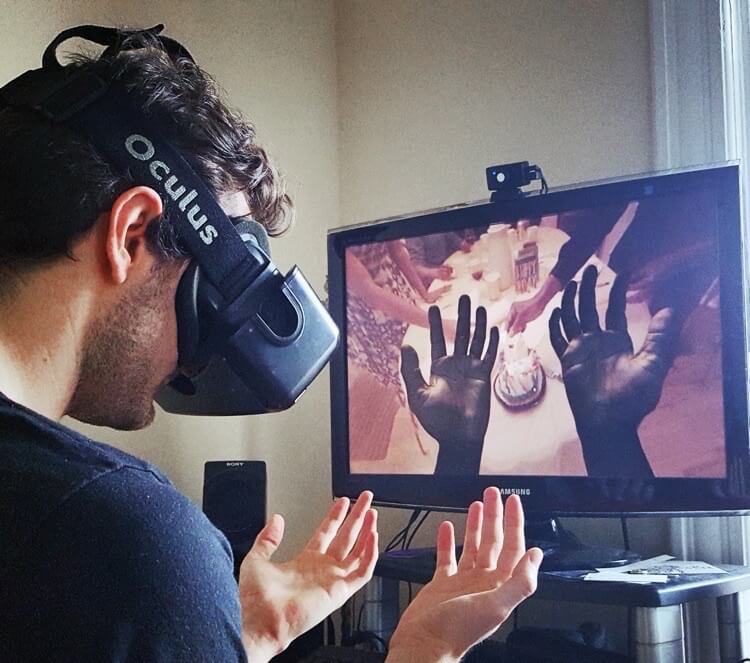REIMAGINE NEWSLETTER: ISSUE 6
DIGITAL CITIZENSHIP: THE CRITICAL CALL TO EDUCATE AND PREPARE 21ST-CENTURY LEARNERS
Embodied Labs is a Reimagine Education Awards 2016 Shortlisted Project.
What do you think of when you hear the words ‘aging’, ‘older adult’, or ‘geriatrics’” the pre-test asks.
The high school student in front of me thought for a moment, then types: “My grandparents. Someone sick a lot…slow…with white hair.”
The screen directs her to don her virtual reality headset. She puts it on, and stretches her hands out in front of her. I can see what she sees in the headset on the screen – a pair of wrinkled hands with medium brown skin. From the next room but getting closer comes the sounds of singing. “Happy Birthday to you…happy birthday to you…”
Back in 2007, Carrie Shaw’s mother was diagnosed with early-onset Alzheimer’s disease when she was a 19-year-old college student. It was a devastating diagnosis for her mother and the whole family. As she declined, her father and siblings all helped with caregiving, though eventually round-the-clock professional care was needed. She died in late 2016 at home. Despite not knowing who she was or who her family members were, Rebecca retained a measure of quality of life – enjoying art, music, and the company of her family and caregivers – right up until the end.
“Over a decade, I watched my mom struggle with her disease,” says Shaw. “I always wondered how the world looked and sounded from her point of view. I wondered how it would positively affect my ability to care for her if I were able to ‘step into her shoes’ so to speak. I wondered how it would help me understand the ways that I could improve her quality of life.”
This lack of perspective is a huge issue for everyone involved in the care team for a person with a disease – not just for those with dementia, but any disease that affects a person’s daily life. It’s hard to understand what it is like to experience a progressive disease – particularly when the person may not have the words to articulate it.
There may be a solution. Embodied Labs, the startup company that Carrie founded with three other business partners, creates virtual reality experiences designed to show the first-person perspective of a person living with a particular disease, pathology, or impairment. Their goal is to create a platform with our content and content from other partners that gives many different types of learners insight into how they can relate to people with diseases or disability — whether the learner is a member of the healthcare system, a student, a family care partner, or member of the community. Embodied Labs first VR experience is called The Alfred Lab, which allows a learner to embody a 74-year old African American man with macular degeneration and hearing loss, the two most common conditions for adults 65 and older. So far, their beta customers have included medical schools, allied health sciences programs, libraries, and long term care facilities. They have also worked with middle school and high school students.

Carrie Shaw, CEO, Embodied Labs
“It doesn’t seem to matter what age a person is – this experience of embodying Alfred is powerful,” says Shaw. “Nearly everyone has someone in their life who they know and love who is either aging and developing age-related conditions, or they know someone who has lived with a disability as part of their daily experience.”

A person using The Alfred Lab simulationvv
Embodied Labs always uses high resolution, live film to create their 360 environments. This allows them to create rich, highly-realistic learning environments with a high level of impact. Unlike computer-generated imagery, live film allows viewers to much more strongly feel that they are actually embodying the person. The computer-generated effects in the lab, such as the person’s hands and other objects in the scenes, allow the learner to accomplish tasks as Alfred – giving them an even stronger sense of embodiment. Research in human cognition and embodiment theories shows that we all learn more effectively and retain more about our learning permanently when we can “learn by doing.” There are quite a few ways that VR technology will continue to develop over the coming months that will allow for even more realistic interaction with the simulation, including voice recognition, eye tracking, and artificial intelligence. Embodied Labs plans to harness these technologies effectively in forthcoming simulations, including The Betty Lab with its Alzheimer’s focus that will be out in the fall of this year.
The Embodied Labs team have seen and heard their customers’ stories of how many people come out of the headset after viewing The Alfred Lab with tears in their eyes. But aside from the emotional impact, the data acquired from our initial pilot studies indicate that after the simulation, students are more interested in working with older adults, far less likely to engage in ageist stereotyping, more likely to agree that they understand the perspective of an aging adult, and learn more about the complexities of disease presentation.
This kind of data is incredibly exciting for Shaw. “When I was in graduate school training to be a medical illustrator, I realized that virtual reality technology had gotten to the point where it could effectively portray complex conditions, and allow a learner to come as close as possible to embodying someone and learning from their experience,” Shaw explains. “Not that you understand exactly what their life is like – that isn’t realistic or possible, but it can give you a window of understanding.”
For the high school student above, embodying Alfred changed her perspective on what it means to age. Instead of describing older adults with some of the stereotypical language she used before the simulation, she said “frustration, need understanding, and ‘just a regular person.’”
So if you are a family caregiver, maybe the simulation helps you be more patient; if you’re a doctor, maybe you take a little bit of extra time to speak clearly or explore how the person’s personal story could affect their medical history or treatment adherence; maybe if you are a high school student working at the grocery store, it gives insight as to why an older person may have trouble with the credit card machine that has nothing to do with their cognitive abilities. Things like that can make a real difference in the lives of people living with diseases that come from aging or other reasons.
Developing the ability to engage in perspective-taking positively affects not just the person with the disease, but also the care providers and care partners. Shaw and her team are working on pilot studies with different user groups that will confirm what they hypothesize — that this type of training affects the quality of care that caregiver and care providers can give to patients and family members; that VR simulations from the patient perspective can increase caregiver confidence and decrease staff turnover; and that a facility or community or family trained with this technology results in a better quality of life for people with disabilities and impairments, age-related or not.
This is only one way that virtual reality is changing the educational landscape. We should expect to see more in 2017 and beyond. The possibilities are literally endless.

